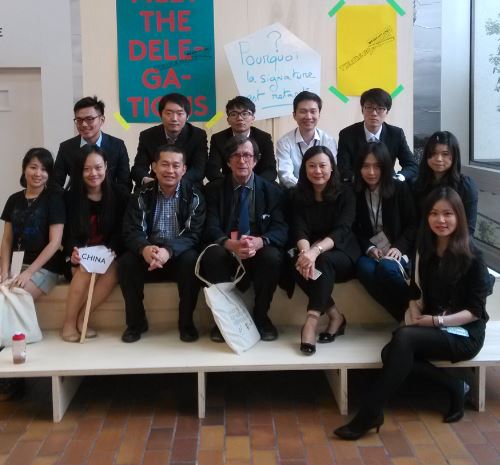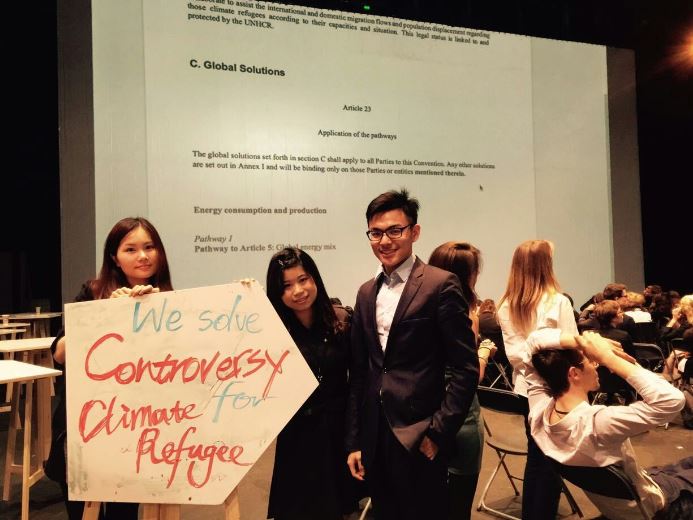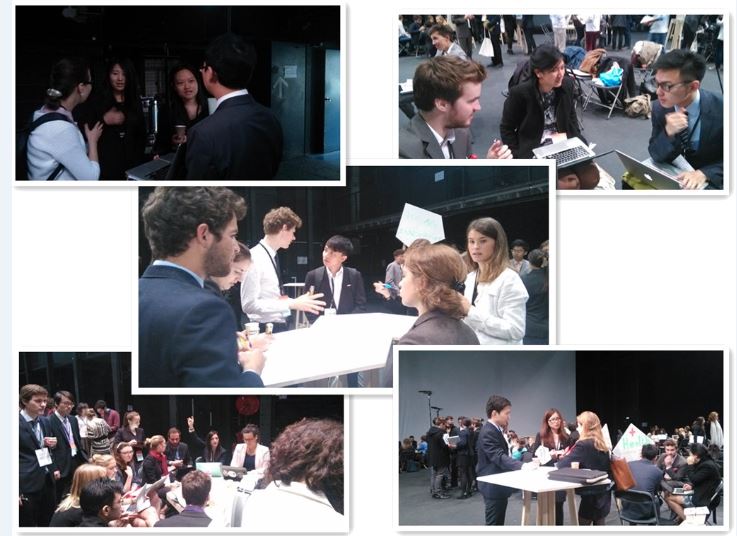Editor’s Note:
【As Special Partner of “Paris Climate 2015: Make It Work” (MIW), a climate change negotiation simulation initiated by Science Po and organized by, for and of students, Tsinghua sent two delegations including ten students to participate in this event in Paris on May 25-31, 2015. The two delegations, representing China and Climate Refugees, talked, negotiated and argued with other 200 students from all over the world, to fight for their representatives in their territories. Both delegations have left strong impressions to the organizer and other delegates. We’ve included below several pieces of our students’ reflections as well as an article cited from the website of the MIW project, which well described the event, its highlights, ups and downs of the negotiation process and reviews.】

Reflections:
Ability to Shape Our Future
Aaron Feng
Two years ago, I participated in a Model UN Conference negotiating the measures to deal with post Rwanda Massacre crisis in 1994. It was about amending UN’s mistake of procrastination in the past. However, in COP21: Make it Work Paris Climate, it is the first time for me to have a direct and complete taste of the democratic system and critical thinking over the design of the discussion modes revolutionary from any of established ones. It is the first time that I am directly involved in the victims of the climate change – climate refugees. What a dramatic surprise that all delegation passed our proposal of admitting the legal status of climate refugees! As John Donne writes, ‘any man’s death diminishes me, because I am involved in the mankind’. After COP21, I not only felt the threat that endangers the homes of Inuit and Maldives, but also spend more time considering practical methods of helping them. Therefore, through COP21, we will not be disappointed at the inability to correct human’s mistakes in the past, instead, we are inspired because we are able to actively shape our future.
The Struggle and Victory of Climate Refugee
Yani Zeng
Participating in the “Paris Climate Simulation Conference: Make It Work” as a delegate from “Climate Refugees” was an unforgettable experience for me. Though I have been studying environment engineering in school of environment, Tsinghua for almost 4 years for my undergraduate study, I have not paid adequate attention to climate refugees, the most vulnerable groups of people facing global climate change.
In order to help the climate refugees reach their goal in the climate negotiation---to get legal recognition and substantiate support from the international community in terms of financing and humanitarian cross-border migration policy, we delegates struggled very hard and finally fought a hard way and succeeded.
At first, we placed our hope on other delegates’ humanitarianism, and appealed the care for climate refugees passionately. Two of our delegates even acted on the first day’s plenary session. When other delegates read out their position paper, we climate refugees delegates chose to act. Two of us acted as a helpless refugee mother who watched her baby died in her arms during the hard migration, and a refugee grandfather who watched the house he built using his lifetime sunk by the rising sea-level and had nowhere else to go. The audience-the general public and other delegates cheered for our sincere performance and appreciated our preparation, however, after the plenary session, it seemed that no one cared or even showed interests in talking to us once they noticed we are delegates from Climate Refugees, instead of China. Indeed, both states and non-states delegates care more about what US, what EU and what the rising BRICKs’ attitude.
The cruel but reasonable reality awoke us. Yes, people all sympathized us, but delegates don’t necessarily need to care us if we do not have any vision and practical pathway. They would more likely than not reject our request if we do not make them realize the urgency of climate refugees, the catastrophes all earth inhabitants would suffer if climate refugees were not settled properly, and the huge potential benefits brought by climate refugees to the host countries as well as the home countries (like broadened market, more fluidity of commodities and adequate labor force).
Therefore, on the last two days, we adjusted our strategy. We stopped appealing emotionally but weakly, and set out to show our comprehensive vision and pathway to other delegates. Since we believed the present UNFCCC and text focused more on mitigation of climate change, we proposed to set up a brand-new and specific workshop to deal with all climate refugees’ issues and focused more on climate change adaptation. We also took the modification suggestion to put this workshop under the framework of UNHCR (United Nations High Commissioner of Refugees) instead of setting up a vague platform for climate refugees from nothing.
Most importantly, after our back-and-forth communication with a broad range of delegations, the concept that climate refugees means opportunity besides obligations for the host countries and international community seemed to have been instilled into many delegates mind.
From that point, we climate refugees started to talk about collaboration instead of pure request with other delegates, and we started to form aligns with marginal and developing countries who have huge climate refugees within their country. We also got support from developed countries, such as US and Canada, even EU and Australia still remained some concerns, but positive changes were really started to happen.
On the last day, after countless hours of writing, persuading and rewriting, our amendments were finally passed by every delegation on the plenary session, and we successfully helped climate refugees gained legal recognition and set up a new and specific workshop to further discuss and tackled the problem through international collaborative efforts.
Driven by the Inspiring Vision of “Make it work”
Huiyi Qiu
Considering the emerging issue of Climate Refugees, our strategy before this simulation began was to first take an ambitious outlook and then settle on something concrete. And apparently it worked eventually, despite the fact that we made actually a lot of compromise.
There are 3 parts for the overall convention: plenary sessions that deal with the general principles and to adopt the written and discussed text; contact groups that work on the Vision; ‘dance of entities’ that allows various entities to have thorough idea-exchange so as to let new proposal sparks. Two steps were to be taken before the negotiation text finalized: Vision and Pathway.
For the first two days of negotiation, delegations discussed vigorously on the text of Vision. As delegation of climate refugees, we were representing the people that are most vulnerable to the negative impacts of climate change. Unfortunately, this issue, like any newly-emerging ones, were not receiving adequate attention, leading the situation from bad to worse. Therefore, we pull out all the efforts to put amendments, a new article actually, on the particular section “endangered species”. Together with Maldives, Bengal and other countries suffering from human displacement, we were in the first place quite ambitious to legalize ‘Climate Refugee’ issue. Yet we ran into conservative power (say EU, Australia) who were reluctant to put this issue into agenda. Endless deadlock eventually led to compromise under the pressure of time. The article legal status of Climate Refugee was voted in front of the all and passed, to our gratitude.
For the last day, despite the desperate night working on the text of Vision, the convention reached the stage of discussing Pathway. Our proposal, built upon sound academic research, focused on building a new convention solving controversy, including the definition of climate refugees and the relocation of displaced persons, for we well understood that much need to be done before the well-being of refugees actually been addressed. The marathon-like struggling for passing our proposal was literally desperate, but it paid out. Though we stepped back from building a new convention to setting up a working group, this 208 delegates in the general convention all voted yes. For the first time ever in international convention, climate refugees were officially written into the finalized pathway.
Rapture caught us immediately. Yet there is still a long way to go. This, to our regret, is merely a simulation, a real good one. We the non-state delegate were thrown into the swirling international negotiation chessboard, driven by the inspiring slogan “Make it work”. Despite the fact that there are some group’s endeavor in the overall welfare of humans and biosphere under the threat of climate change, political power beneath dominate and limit our actual action taken.

COP21 Make It Work Reaches Universal Climate Deal To Protect The Planet –
· Climate accord success after tough, week-long negotiations among 41 delegations
· New deals among State and non-State actors shatter preconceptions on new ideas
· Highlights include agreements on energy and global ecosystem governance
In an extraordinary evening on Sunday 31 May, the delegates of the COP21 Make It Work simulation reached a visionary, last-gasp deal to protect the planet from the most harmful effects of climate change, after difficult and highly-charged, week-long negotiations.
In the “Theatre of Negotiations” at Nanterre-Amandiers outside Paris, some 41 delegations of more than 200 students from across the world overcame deep-seated difficulties and frustrations to achieve consensus among State entities and “non-State” entities.
The new format, bringing the orthodox, sovereign State Parties of the United Nations climate negotiations into direct talks with non-State delegations (such as Forests, Cities, Sahara and Oceans), made for extremely complex negotiations but also a highly valuable and innovative blueprint for future multilateral talks.
Negotiations proved far from straightforward for international delegates. By the penultimate day, prospects of a universal, much less an innovative, ambitious climate deal, looked very bleak. It became painfully clear to delegates and the simulation’s UNFCCC Secretariat that the State-centric UN-type format was unsuited to real progress and that the reach of non-State actors such as Oceans and Forests was causing a politico-administrative headache on the question of sovereignty.
However, last-ditch attempts by utterly determined delegates from all Parties took negotiations through the night before the final day, including painstaking efforts to make complex proposals for final plenary on global environmental governance, ensuring the most vulnerable ecosystems were represented in the global intergovernmental architecture of the modern day.
The final hours of negotiations on the final day saw two plenary sessions and countless, frenetic side negotiations within the four thematic “Contact groups”, which were to form the basis of the final text: Energy consumption and production; Land, air and water; Governance; and Endangered Territories.
The most crucial compromises to reach a final text came within the last hour and even minutes of negotiations. As the final plenary drew to a close, deals had yet to me made on key energy provisions (such as a formula for global energy mix), climate finance and the protection of endangered territories, notably an Arctic region rich in hydrocarbon reserves.
Reservations on climate finance by delegations such as India forced yet more deals, and other dramatic compromises on climate refugees, quickfire deal-making on Arctic exploration and drilling, and the sheer weight of expectation on delegations to deliver climate success produced a final, universal agreement in the dying minutes in the “Theatre of Negotiations”.
Was this a utopian deal? Not so, according to Bruno Latour:
“It is the [UNFCCC] Conference of the Parties process which is utopian and that is why it is failing. It is absolutely vital that before 2015 comes to an end, the public understands we have to make the COP negotiations credible and to achieve this we will in any case have to follow such ideas as those delivered by the students [of COP21 Make It Work].”
At the very end of negotiations, the exhausted delegates who had pushed so hard to formulate an ambitious, innovative accord, agreed unanimously on a text which set out key definitions, followed by provisions outlining “visions of the future” and, crucially, pathways to “global solutions”. These visions and pathways formed the basis of true innovation and divergence from the Westphalian orthodoxy in “real” life; an orthodoxy which has, time after time, repeatedly failed to deliver an agreement on climate and sustainability.
But what now for COP21 Make It Work? Over the coming weeks and months in the run up to Paris Climat 2015, the scientific, political and artistic feedback from this experiment of astounding ambition will, as mediatic and political attention suggest, be analysed by an ever-growing list of parties who are asking real questions of the current provisions in place to secure a climate-resilient planet and a sustainable world for future generations; generations already paying the price for the grave mistakes of the past.
Why did Sciences Po, its Programme of Experimentation and Arts in Politics (SPEAP) and their international partners come up with COP21 Make It Work?
French Ambassador for the Climate Negotiations, Laurence Tubiana, provides a stark warning of why this week-long climate “laboratory” was as timely as it was crucial in this COP21 year:
“This idea of an experiment is extremely useful. It has a sense because we need to find new ideas to move forward [in the UNFCCC climate change negotiations], otherwise, objectively speaking, every political analyst says there is no reason to suggest we’ll get there”.
The time has come for global, universal climate action which delivers real protection for all against the most harmful effects of climate change and spurs a new age of sustainable growth. From one group of students from communities across the world, to those international leaders converging on Paris in December, you must Make It Work.
If we don’t find a way to address climate change, no one will do it for us; “simulation” or “real life”, of that we can be certain.
